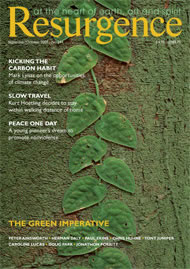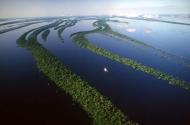IT HAS BEEN said that “the economy is a wholly owned subsidiary of ecology,” but the economic paradigm which is now sweeping the world operates as if it were the other way around. Governments, industries and businesses, north and south, east and west, apart from a few enlightened exceptions such as in Bhutan, believe that the economy comes first; that with economic growth it is possible to manage ecology and clean up the environment. This particular paradigm is at the root of the climate crisis.
The words ‘ecology’ and ‘economy’ come from the same Greek root, oikos, which means ‘home’. Home is always a place of deep and intricate relationships based on mutuality, reciprocity and co-operation. Logos means ‘knowledge’ and nomos means ‘management’. So ecology is knowledge of the home and economy is management of the home.
If we don’t know our home we cannot manage it, so ecology must come first. If there is no Earth wellbeing there can be no human wellbeing. If there is no healthy Earth community there can be no healthy human community. If there is no ecological capital then there can be no financial capital. Financial capital is only an idea, a human device to make the exchange of goods and services easier – finance is basically a figure on a balance sheet. The real capital is the Earth itself. As E. F. Schumacher said, “Nature is our true capital.”
If the economy is growing but ecology is shrinking then such economic growth is dangerously unsustainable. Growing the economy at the expense of ecology is the fundamental cause of global warming. If we want a sustainable future, if we want to solve the problem of climate change, our first and foremost responsibility is to protect and maintain ecosystems such as the biodiverse rainforests and to promote ecological farming.
Unfortunately the present economic paradigm has turned reality upside down. Economists, industrialists, bankers and financiers believe that money is wealth and nature is there to be transformed into figures on a balance sheet. What does it matter if the forests have gone and the biosphere is polluted? As long as we have money, we can fix these problems one way or another. But money is not wealth; it is only a way of measuring human activities or the transactions of goods and services.
It is only in the past few hundred years that we have become so entangled with the system of money that we cannot imagine our existence without it. However, before the industrial revolution most societies, cultures and communities lived without banks, building societies, hedge funds and stocks and shares. But now money has become so central to our lives that nature has been turned into a commodity which can be bought and sold with money.
Moreover, 80–90% of the money swirling around the world, day and night moving from one account to another at the press of a button, has little connection to land, labour or goods; it is simply money chasing more money.
There is nothing wrong with the idea of money in itself – it is a wonderful invention. It can make life very easy and convenient as long as it serves the Earth community as well as the human community. But when humans and natural resources are sacrificed to the economy, then the balance of ecology and economy is destroyed.
Our efforts to reduce carbon emissions are important but carbon trading, finding alternatives to fossil fuels and other technological solutions should not become the reason for not taking the equally, if not more important steps of valuing and protecting the biosphere and of finding ways of living that are the bedrock of climate security. Focusing only on carbon emissions without protecting ecosystems is only treating the symptoms rather than addressing the root causes of global warming.
In this issue of Resurgence we offer an alternative G8: eight green thinkers put forward eight imaginative proposals and creative ideas which could bring back a system where the economy is a wholly owned subsidiary of ecology again.
SATISH KUMAR







